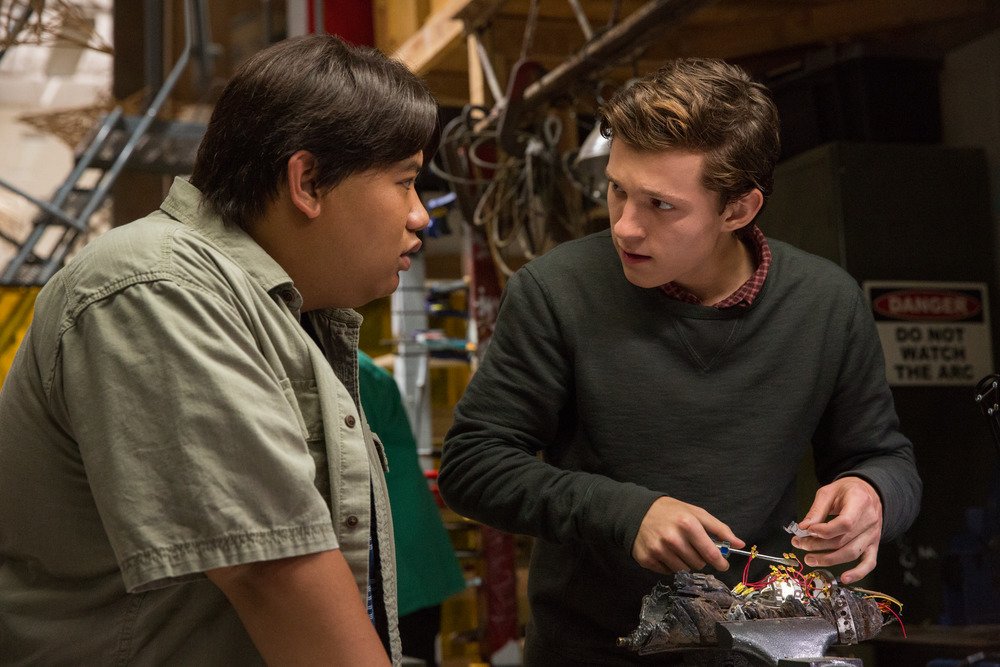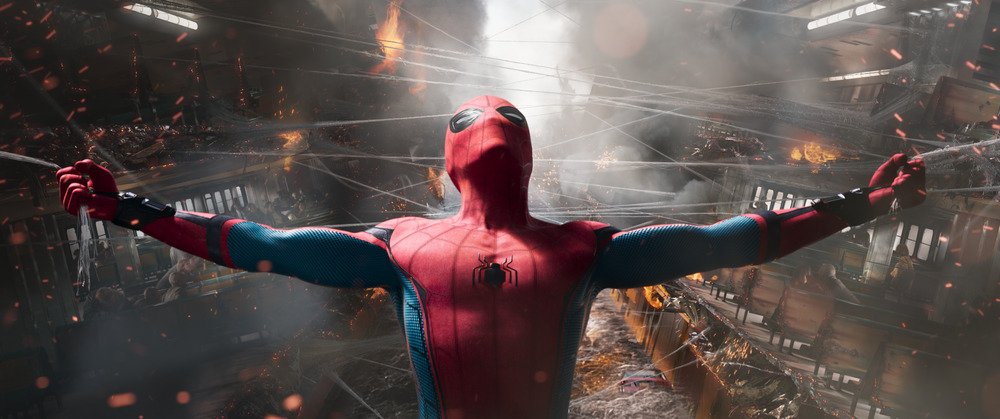Picking up from the new Spider-Man’s debut in Captain America: Civil War – the film literally starting with smartphone footage of events from that film from Spidey’s perspective – from the very beginning of Spider-Man: Homecoming it’s clear that Marvel Studios and director Jon Watts have a very different vision for the character than we’ve seen on the big screen before.
Taking the character back to school, ageing him down and containing the action to his home neighborhood in suburban Queens, this new version of Spider-Man – aka Peter Parker – is not only truer to the character in the comics, he is also a joy to watch, not least because of Tom Holland’s amazingly charming performance in the role.
Yet multifaceted as this re-imaging is, it hinges on one simple truth about the character. He is more compelling and just plain fun as a dorky high school teenager as opposed to just another moody adult, and what the film does best is allow us to escape into the mind and experience of what it would be like to be a teenage superhero.
Not A Spider-Boy, Not Yet A Spider-Man
Think about it, every other superhero has adult problems. Tony Stark has a company, shareholders and some deep daddy issues. Black Panther has to rule a kingdom. Captain America literally fought in World War Two.
By comparison, in Spider-Man: Homecoming Spidey ends up giving away his secret identity because his best friend was waiting in his room to build a Lego Death Star, and one of his biggest problems is not being able to talk to girls. He even refers to his crime-fighting work with Stark and the Avengers as an internship, taking the aforementioned smartphone footage as a memento of the airport battle from Civil War.
This new formulation of the character allows the film to explore something a lot of other comic book movies have forgotten or never even thought of in the first place – that having super powers would be pretty damn cool, especially if you’re a teenager.
Peter Parker’s Day Off
Part of how the film does this so well is by drawing on the rich tradition of coming of age high school movies, with a particularly John Hughes feel pervading the story from start to finish. Watt’s doesn’t play coy with this at all, even directly referencing the backyard chase sequence from Ferris Bueller’s Day Off.
Yet to call the film Ferris Bueller’s Day Off with superpowers – as some critics have done – is too reductive, as it does as much to subvert the conventions of the high school sub-genre as it apes them. In fact what the films does so well is make a lot of tired tropes fresh again by subtly updating them for the present day.
Peter’s academic ability for instance is a source of status and praise for him, rather than a burden. Watts even has him be socially punished for pulling out of the academic decathlon, rather than be teased for participating.
This also plays into one of the more nuanced yet less central touches the film adds to the world, that of Peter’s longtime school bully Flash Thompson. Just as the film subverts the trope of the nerd punished for their intelligence, so too does it invert the stereotype of the school bully as a meathead jock. Instead what we get is just an average guy, whose own place within the school hierarchy is threatened by Peter, which in turn motivates his bullying.
The result is that instead of a two dimensional stereotype, we get a more fleshed out and human character, with their own fears and desires that support the main action of the film . It’s a small touch to be sure, but the film is full of these and they work together to elevate what could in the wrong hands have come off as a by the numbers genre mash-up.

Super-Human Relationships
It’s not all fun and games though, and Peter soon has to face some real grown up problems of his own as the film moves towards its denouement. I mean it wouldn’t be a coming of age high school drama if he didn’t right?
As it does so though, the film still manages to cast the action within a kind of twisted high school family drama, putting the focus on the human, or should I say super-human relationships at the core of the action rather than just the spectacle of violence. This is perhaps best encapsulated by the dual patriarchs of Robert Downey’s Junior’s Tony Stark and Michael Keaton’s Adrian Toomes aka The Vulture.
Peter’s relationship with Stark forms one of the film’s emotional centers, with RDJ playing the charming, demanding yet largely absent father figure to a tee. We not only like Stark, but just like Peter we want to impress him, which makes it all the more heartbreaking when he delivers a slightly altered version of the lines every teenager dreads to hear from their role model; I’m not angry, I’m just disappointed.
Two Households, Unlike In Dignity
Where things get really interesting however is when Peter’s personal life gets wound up in his crime-fighting after it’s revealed that The Vulture is his crush Liz’s Allan’s father. Keaton is fantastic in the role, and is clearly enjoying himself playing a very different kind of bird man here. Bringing the kind of humanity to the role that many of the MCU’s villains lack, Keaton adds realistic weight to the revelation, and Peter’s realisation that by bringing him to justice he will also be depriving Liz of her father.
Yet it goes deeper still, with Toomes’ motivation to turn to a life of crime stemming from Stark ruining his business, salvaging advanced technology from the ruins left by the MCU’s many super-powered battles. Overextended financially on a job, and run out of the legitimate industry by Stark, instead of returning the tech he’d already salvaged to his newfound nemesis and face bankruptcy, Toomes decides to sell it on the black market. Cut to eight years later and he is running a thriving trade in advanced weaponry adapted from the salvaged tech.
Framed along these lines, The Vulture and Iron Man then end up playing opposing patriarchs in a kind of Romeo & Juliet love story, albeit one where Romeo has the powers of a spider and has to fight Juliet’s dad – which if I’m honest sounds a lot better than the original. Both are just trying to protect others – Toomes his family and Stark the world – from the threats of a changing world, both technologically speaking but also financially.
Importantly though, for the future of the MCU, it adds a layer of depth to the relationship between Peter and Stark, with the sins of the father being forced on to the son. The irony of all this in the film is that while Stark is doing everything he can to protect Peter from himself – especially the super powered Spidey suit he gave him in Civil War – it’s Stark’s own efforts to protect the world that end up putting it, and Peter in danger. Meanwhile his hubris in ignoring Peter’s warnings about Toomes ends up leaving him open to attack, with only Peter’s teenage recklessness and need to do the right thing saving him in the end.
Sins Of The Father
What this does then is set up Peter’s place in the larger MCU as “The Son of Stark” in a meaningful and moving way. More than just that though, by showing us Peter’s smaller teenage world against the larger backdrop of the universe it reminds us what the heroes are fighting to defend in the first place.
While abstract notions of freedom from oppression, the pursuit of justice and the sanctity of life underlie the action of many of the franchise’s films, none of them make the battle as real in human terms as Spider-Man: Homecoming. And as the universe hurtles toward the dramatic conclusion of the overarching Infinity Stone narrative in Avengers: Infinity War, understanding exactly what our heroes are fighting for is more important than ever. And what better reason is there to fight than to defend the right for teenagers to be the reckless, enthusiastic and naive beings they are?
–
‘Spider-Man Homecoming’ is out now on 4K Ultra HD™, Blu-Ray™, DVD & Digital.









